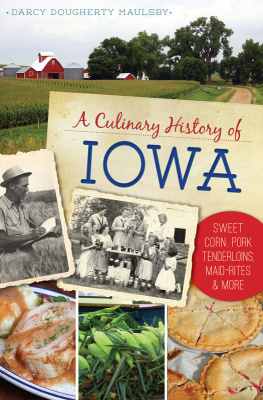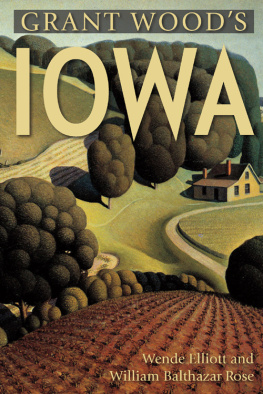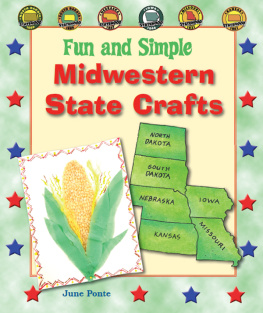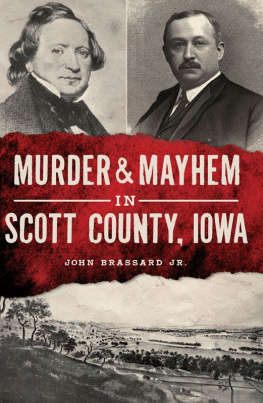


Published by American Palate
A Division of The History Press
Charleston, SC
www.historypress.net
Copyright 2016 by Darcy Dougherty Maulsby
All rights reserved
Cover images: The corn grows tall near a farmstead in northwest Iowa. Authors collection; an array of pies, from strawberry-rhubarb to cherry to peach, tempt bicyclists who stop at food stands in small towns and cities across Iowa as they pedal across the state each July for RAGBRAI (Registers Annual Great Bicycle Ride Across Iowa). Authors collection.
First published 2016
e-book edition 2016
ISBN 978.1.43965.699.0
Library of Congress Control Number: 2016936009
print edition ISBN 978.1.46713.632.7
Notice: The information in this book is true and complete to the best of our knowledge. It is offered without guarantee on the part of the author or The History Press. The author and The History Press disclaim all liability in connection with the use of this book.
All rights reserved. No part of this book may be reproduced or transmitted in any form whatsoever without prior written permission from the publisher except in the case of brief quotations embodied in critical articles and reviews.
CONTENTS
ACKNOWLEDGEMENTS
When you undertake a project as massive as trying to tell even a slice of Iowas rich culinary history, you certainly cant do it alone.
I appreciate all the help Ive received from many resources, including various restaurants, museums, libraries, amateur historians and foodies across the state. Id especially like to thank Iowas amazing independent restaurants like Cronks in Denison, the Northwestern Steakhouse in Mason City, Archies Waeside in LeMars, Breitbachs Country Dining in Balltown and so many others that make Iowa a much more interesting, flavorful place to live and visit.
Its exciting to see how Iowas talented chefs are transforming Iowas dynamic culinary scene. Im forever grateful to my friend Chef George Formaro of Des Moines for patiently answering my questions related to food, recipes and more. Its wonderful to find a kindred spirit when it comes to preserving Iowas culinary history.
Thanks, also, to the fine staff at the Hotel Julien Dubuque, not only for welcoming me to experience this legendary hotel but also for showcasing a unique piece of local history. I also appreciate all the friendly, helpful people who have shared stories of great Iowa food businesses, from the Mississippi River to the Missouri River.
In addition, Im glad to see so many history buffs and foodies sharing photos, stories, memorabilia and more on fun social media sites like Iowa on a Plate on Facebook, as well as Lost Des Moines, Memories of a Younkers Tea Room, the Forgotten Iowa Historical Society and more. Its great to live in a time when history can live on and reach a wider audience than ever.
I know I havent properly thanked everyone who contributed to this book, but rest assured, I do appreciate all the food for thought youve given me that I can share with readers. Finally, Id like to thank my commissioning editor, Ben Gibson, and the great team at The History Press for making this book possible and helping preserve Iowas culinary history. Lets dig in!
INTRODUCTION
In Iowa, We dont meet if we dont eat could be the states unofficial motto. It makes sense, if you think about it. When youre blessed to live in one of the worlds most abundant agricultural regions, you live close to the land and benefit from the bounty it provides, including fresh, delicious food.
While Iowa isnt always recognized as a culinary epicenter, Ive always believed that no one knows more about the fine points of food than those who produce it. Is it any wonder that generations of Iowa farm cooks mastered the art of preparing exceptional meals made with farm-fresh ingredients? Its also clear that Iowas food scene has been evolving in recent years. New generations of innovative Iowa chefs and home cooks are adding their own twists on Iowa fare as they create memorable meals with some of the best beef, pork, turkey, sweet corn and home-grown produce raised in America.
A unique mix of progressivism and provincialism is reflected in Iowas food, as well as its culture and politics. This is a state distinguished by some beloved culinary traditions that offer an extraordinary taste of Midwestern life, from Maid-Rite loose-meat sandwiches to dinner platesized breaded pork tenderloins to the classic school lunch combo of chili and cinnamon rolls. And dont forget Jell-O, which often shows up in dishes that most people would consider desserts but Iowans define as salads.
As Ive explored my home states culinary traditions, Ive been impressed by just how passionate Iowans (and former Iowans) are about Iowa food. Its also inspiring to see just how much care, love and energy Iowans infuse into everything they do, whether they farm, run a mom and pop restaurant or prepare favorite recipes for family and friends. Through it all, Im reminded of the importance of supporting locally owned businesses and giving back to the local community when I visit with Iowans who remain rooted in the essentials of farming, faith and food.
As Ive compiled a smorgasbord of stories, recipes and photos for this book, I know Ive only scratched the surface. While this is just a tantalizing slice of Iowas culinary history, I hope it offers you a new taste of what makes Iowa distinctive and remarkable. Come along on this delectable journey and feast on Iowas extraordinary culinary history.
Chapter 1
EXPLORING IOWA
Located in the heart of America, Iowa is the land between two rivers, a region of the Midwest distinguished by a surprisingly rich, diverse cultural and culinary history.
Between the forests of the eastern United States and grasslands of the Great Plains to the west, Iowas gently rolling landscape extends westward from the Mississippi River, which forms the states entire eastern border. The Missouri River forms the western border, making Iowa the only U.S. state with two parallel rivers defining its borders.
Rivers were the early highways, bringing explorers, trappers, traders and settlers to the Iowa prairie. Centuries before the Europeans arrived, however, various Native American tribesincluding the Sac, Fox, Sioux, Ioway, Meskwaki and otherslived, hunted and farmed across the region. The meaning of the name Iowa depends on who you ask. Traditionally, it has been described as an Ioway word meaning the beautiful land, although others say that Ioway itself is the French spelling of Ayuhwa, a name meaning sleepy ones, a name given in jest to the Ioway tribe by the Dakota Sioux.
Living off the land defined the food and farming traditions of tribes like the Ioway, whose history is carefully re-created at Living History Farms in Urbandale. Ioway farmers raised corn, beans, melons and squash. Women did the farming in the Ioway culture, while men were responsible for hunting and making tools. Ioway families were subsistence farmers, raising just enough for their family to survive throughout the year and having a little put away in case of a bad year.
The Ioway had separate summer, winter and traveling lodges. Bark houses called nhachi kept the Ioway cool during hot summer months, while winter mat-houses called
Next page








